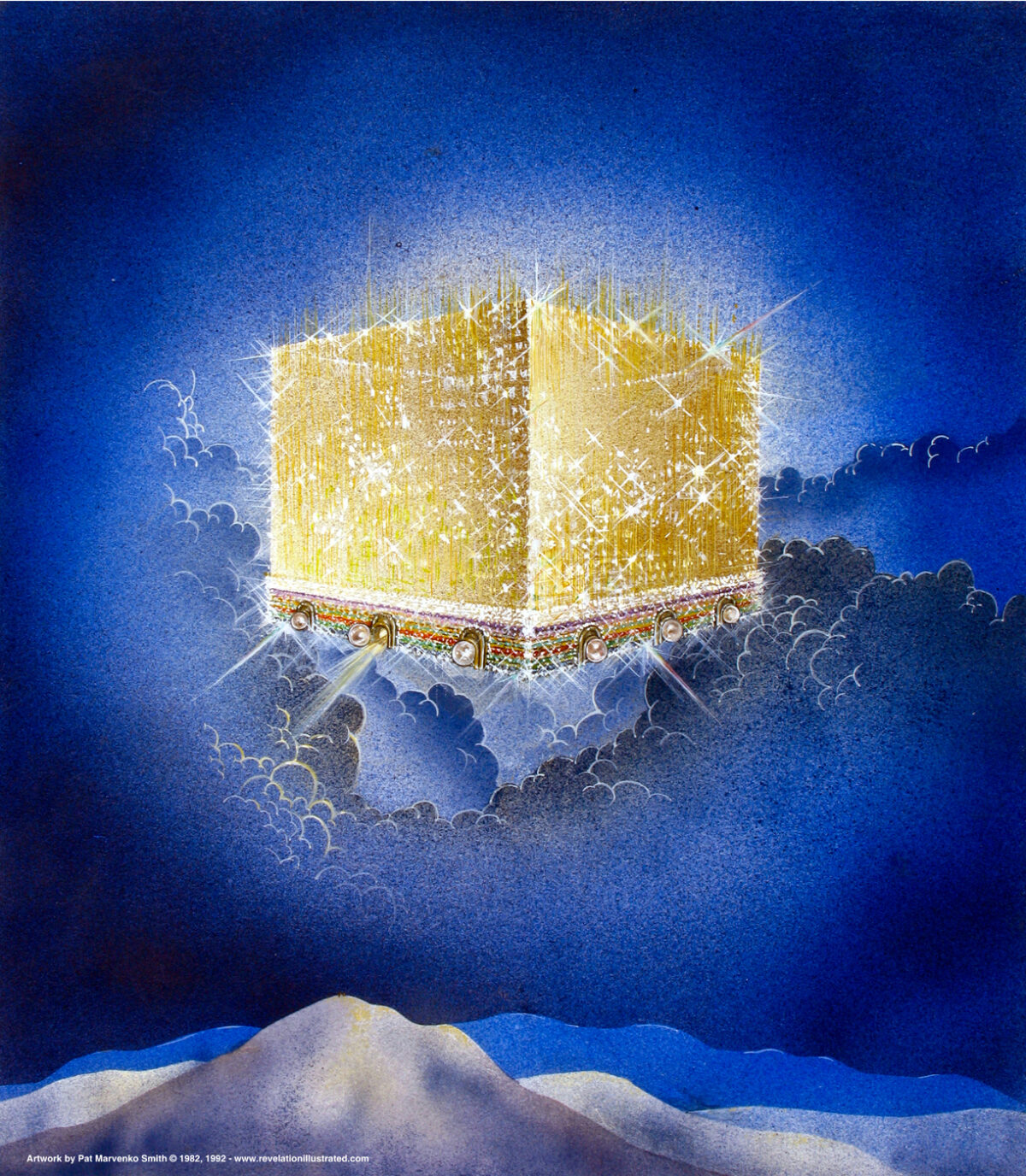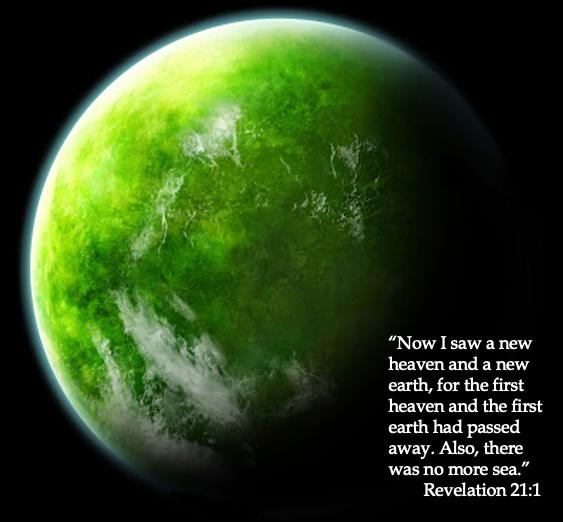“And he carried me away in the Spirit to a great and high mountain, and showed me the city, the holy city, Jerusalem, descending out of heaven from God.” Revelation 21:10
The night before Jesus’ crucifixion when Satan entered Judas and Judas went out to betray Christ (John 13:27-30), Jesus then said to His eleven remaining disciples, “31 Now the Son of Man is glorified, and God is glorified in Him… 33 Little children, I shall be with you a little while longer. You will seek Me; and as I said to the Jews, ‘Where I am going, you cannot come,’ so now I say to you. 34 A new commandment I give to you, that you love one another.” (John 13:31, 33-34).
While the other disciples remain silent, Peter ignores Jesus’ command to love one another and focuses on Christ’s phrase, “Where I am going, you cannot come.” Peter does not like to be told what he cannot do, so he asks Jesus, “Lord, where are You going?” (John 13:36a).
Instead of answering Peter’s question directly, Jesus stares at Peter and says, “Where I am going you cannot follow Me now, but you shall follow Me afterward.” (John 13:36b).
Peter is not willing to accept what Jesus is saying, so he quickly retorts, “Lord, why can I not follow You now? I will lay down my life for Your sake.” (John 13:37).
Without hesitation, Jesus says to Peter, “Will you lay down your life for My sake? Most assuredly, I say to you, the rooster shall not crow till you have denied Me three times.” (John 13:38).
Peter probably looks down at the table when he hears Jesus’ rebuke. The awkward silence that follows is suddenly interrupted by Jesus’ words:
“1 Let not your heart be troubled; you believe in God, believe also in Me. 2 In My Father’s house are many mansions; if it were not so, I would have told you. I go to prepare a place for you. 3 And if I go and prepare a place for you, I will come again and receive you to Myself; that where I am, there you may be also. 4 And where I go you know, and the way you know.” (John 14:1-4).
No doubt the imaginations of the eleven disciples began to soar wondering what Jesus meant when He promised to “prepare a place for” them and then “come again and receive” them to Himself (14:2-3). The apostle John was among those remaining disciples that night, reclining next to Jesus listening to His every word.
Years later when John was on the island of Patmos, the Lord Jesus reveals details about the place He has been preparing for His church on the new earth in the New Jerusalem (Revelation 21:9-22:5). 1
Beginning in Revelation 17, John began to contrast two cities, both of which were portrayed as women. “The great harlot” representing the city of Rome was wicked and temporary (Revelation 17-18). The “New Jerusalem,” also called “the Lamb’s bride,” is perfect and eternal (Revelation 21:9-22:5). 2
John is about to begin a guided tour of the New Jerusalem from one of the angels from the seven bowl judgments. “Then one of the seven angels who had the seven bowls filled with the seven last plagues came and talked with me, saying, ‘Come, I will show you the woman, the Lamb’s bride.’” (Revelation 21:9). Just as one of the seven bowl angels invited John to come see “the great harlot” (17:1), now another “one of the seven angels” who poured the “bowl” judgments invited John to “come” see “the Lamb’s bride” (21:9). Clearly John is making a connection between “the Lamb’s bride,” the Church (cf. 19:7, 22:17; 2 Corinthians 11:2; Ephesians 5:27), and the New Jerusalem (21:10). For nearly two thousand years the Lord Jesus Christ has been preparing this special place for those who comprise His bride, the Church (John 14:1-3), where they will enjoy uninterrupted perfect fellowship with one another. 3
Hence, every believer in Jesus during this Church Age will live in the New Jerusalem and all other believers before and after the Church Age will live outside the City on the new earth. But these other believers will also have access to the New Jerusalem (22:27b).
Next John writes, “And he carried me away in the Spirit to a great and high mountain, and showed me the city, the holy city, Jerusalem, descending out of heaven from God.” (Revelation 21:10). In his vision of the harlot the bowl angel transported John into the wilderness (17:3), but this bowl angel “carried” John “away in the Spirit to a great and high mountain.” Observe this is “a… mountain,” not “the… mountain.” This tells us that there will be more than one mountain on the new earth. 4
Alcorn writes, “Just as our resurrection bodies will be better than our current ones, the New Earth’s natural wonders will presumably be more spectacular than those we now know. We can expect more magnificent mountains and more beautiful lakes and flowers than those on this earth. If we imagine the New Earth to have fewer and less beautiful features than the old, we picture the earth’s regression. The least we should expect is retention. But in fact, I believe there’s every reason to anticipate progression. The depiction of the precious metals and stones and vast architecture is lavish beyond imagination, as are the descriptions of trees on both sides of the great river, bearing fruit each month. Everything God tells us suggests we will look back at the present Earth and conclude, creatively speaking, that God was just ‘warming up’ and getting started.
“Look at God’s track record in creating natural wonders in the universe. On Mars, the volcano Olympus Mons rises 79,000 feet, nearly three times higher than Mount Everest. The base of Olympus Mons is 370 miles across and would cover the entire state of Nebraska. The Valles Marineris is a vast canyon that stretches one-sixth of the way around Mars. It’s 2,800 miles long, 370 miles wide, and 4.5 miles deep. Hundreds of our Grand Canyons could fit inside it.
“The New Earth may have far more spectacular features than these. Imagine what we might find on the new Mars or the new Saturn and Jupiter and their magnificent moons. I remember vividly the thrill of first seeing Saturn’s rings through my new telescope when I was eleven years old. It exhilarated me and stirred my heart. Five years later, I heard the gospel for the first time and came to know Jesus, but the wonders of the heavens helped lead me to God. How many times in the new universe will we be stunned by the awesomeness of God’s creation?
“Remember, God will make the new heavens, which will correspond to the old and which will therefore include renewed versions of the planets, stars, nebulae, and galaxies God created in the first heavens.
“The New Earth’s waterfalls may dwarf Niagara – or the New Niagara Falls may dwarf the one we know now. We will find rock formations more spectacular than Yosemite’s, peaks higher than the Himalayas, forests deeper and richer than anything we see in the Pacific Northwest.” 5
On this magnificent mountain, John was shown “the holy city, Jerusalem, descending out of heaven from God” (21:10b). The “New Jerusalem” is called “the holy city” in contrast with the earthly Jerusalem that existed as the capital city of the Millennial Kingdom of Christ. 6 That earthly Jerusalem will be destroyed at the end of the Millennium when the old heaven and earth are destroyed by fire (21:1b; cf. 2 Peter 3:10-13). Since we know that Jesus currently dwells in the third heaven at the right hand of God the Father (2 Corinthians 12:1-4; cf. Acts 7:55-56; Mark 16:19; Hebrews 12:2), we can assume He is preparing this city in the third heaven (John 14:1-3). 7 John then watches the New Jerusalem complete its descent to the new earth “out of” the third “heaven from God.”
John describes the appearance of this city as “having the glory of God. Her light was like a most precious stone, like a jasper stone, clear as crystal.” (Revelation 21:11). John uses two words to describe the stunning appearance of the New Jerusalem: “glory” (doxan) which refers to “the state of being magnificent, greatness, and splendor” 8 and “light” (phōstēr) which expresses “the state of brightness or shining, splendor or radiance.” 9 Together these two words describe the brilliant, glowing presence of the Lord Jesus Christ Who will illuminate the entire city (cf. 21:23; 22:5). 10 Christ’s glorious presence will make the New Jerusalem look like “a most precious stone, like a jasper stone, clear as crystal.”
“The jasper stone known today is opaque and not clear (cf. 4:3). It is found in various colors, and John apparently was referring to the beauty of the stone rather than to its particular characteristics. Today one might describe that city as a beautifully cut diamond, a stone not known as a jewel in the first century.” 11
Another commentator writes, “Heaven’s capital city is thus pictured as a huge, flawless diamond, refracting the brilliant, blazing glory of God throughout the new heaven and the new earth.” 12
John was trying to describe what he saw in a way that would be familiar to his readers. However, it is evident that what he sees transcends anything he had experienced. Nothing on earth even begins to describe what the Lord Jesus has prepared for us because any choice of words falls short of capturing “the breathtaking intensity of His glory.” 13
During Jesus’ earthly ministry, He said, “I am the light of the world.” (John 8:12a). When Jesus said, “I am the light of the world,” it’s as though He was saying, “Do you remember the pillar of fire that came between the Israelites and the Egyptians near the Red Sea, the pillar that protected them and led them on their wanderings in the wilderness? That was My presence with them. I was God with them, and I am God with you! It was I who protected them. It was I who guided them through the wilderness. I am the light of the WORLD – not just the light for the nation of Israel, but the light for the entire the world. I offer hope to every one of every country, culture, and color.” What a statement! Jesus is claiming to be God and He alone can give us eternal life!
The phrase “I Am”is how God identified Himself to Moses at the burning bush (Exodus 3:13-14). “I Am”is also how Jesus will continue to state His own identity to the people of Israel.
In the final stage of heaven on the new earth in the New Jerusalem, “the light of the world” will shine so brightly in His exalted and glorified condition that there will be no need for the sun or moon in the New Jerusalem (Revelation 21:23; 22:5). Jesus will be the source of light in the New Jerusalem, and He is the source of light for us today.
Do you want to join Jesus Christ as God’s child of light in the final stage of His heaven on the new earth? If you do, listen to what Jesus says in John 12:36: “While you have the light, believe in the light, that you may become sons of light.” As soon as possible, “while you have the light,” you need to decide what you will do with Jesus. No person is promised tomorrow on earth, so it is important for you to respond in faith to Christ while you still have time.
Notice that Jesussays you can become “sons of light” (or daughters of light) simply by believing or trusting in Him alone for His gift of salvation. This verse does not say you become “sons of light” by living a good life, praying, or being religious. The only condition is to believe in the light which is Jesus Christ. To believe in Jesus means to be convinced that He is speaking the truth here and is therefore trustworthy.
Let me ask you a question that all of us ought to consider: “If you were to die today, would your relatives know where to find you?”
John B. McFerrin, a noted preacher in the South, was dying. He was ready to die, and he was eagerly looking forward to being with the One he had loved and served so faithfully. His son, also in the ministry, spent as much time as possible at his father’s bedside. But one Saturday he found it necessary to leave him because he had to fill a preaching assignment in another city. Well aware of his father’s grave condition, he was hesitant about going. Sensing his son’s reluctance, McFerrin encouraged him to be on his way. “So, you’d better get started,” he said. “Don’t worry about me. I’m feeling some better today. But if I should slip away while you’re gone, you’ll know where to find me!” 14
Why could McFerrin say that? Was it because he had been a preacher? No, because that will not get you to heaven. Was it because he had lived a good life? No, because that does not get you to heaven. It was because he believed in Christ, the light of the world, who died in his place and rose from the dead.
What about you? Could you say something like what McFerrin said to your own relatives? If not, take a moment, and take Jesus at His Word when He said, “While you have the light, believe in the light, that you may become sons of light.” The moment you believe in Jesus, you become a child of God who will live with Jesus in the New Jerusalem. Thank God for His grace which makes this possible!
Prayer: Precious Lord Jesus, we praise You for the incredible place You are preparing for those of us who believe in You. None of us could ever deserve to live in such a glorious place. But because of Your grace, we can live with You forever the moment we believe in You for Your gift of everlasting life. Thank You that there will be no more darkness or shadows there because Your glorious presence will illuminate the entire City. As we reflect on Your love and grace toward us, we are motivated to share the good news of eternal life with those who are perishing without You. Please give us opportunities today to share Your gospel with the lost. We pray Your Holy Spirit would prepare them to hear and believe it. Thank You for hearing our prayers. In Your mighty name we pray, Lord Jesus. Amen.
ENDNOTES:
1. Adapted from Charles Swindoll, Insights on Revelation (Swindoll’s Living Insights New Testament Commentary Book 15, Tyndale House Publishers, Inc., 2014 Kindle Edition), pp. 384-385.
2. Bob Vacendak; Robert Wilkin; J. Bond; Gary Derickson; Brad Doskocil; Zane Hodges; Dwight Hunt; Shawn Leach; The Grace New Testament Commentary: Revised Edition (Grace Evangelical Society, Kindle Edition, 2019), pg. 1584.
3. Ibid.; cf. Tom Constable, Notes on Revelation, 2017 Edition, pg. 239 cites Robert Gundry, “The New Jerusalem: People as Place, not Place for People,” Novum Testamentum 29:3 (July 1987):256.
4. Randy Alcorn, Heaven: A Comprehensive Guide to Everything the Bible Says About Our Eternal Home (Tyndale House Publishers, 2004 Kindle Edition), pg. 364.
5. Ibid., pp. 364-365.
6. John F. Walvoord, The Bible Knowledge Commentary Epistles and Prophecy, Editors John F. Walvoord and Roy B. Zuck (David C. Cook, 2018 Kindle Edition), location 6517.
7. David Jeremiah, Answers to Your Questions about Heaven (Carol Stream, IL: Tyndale House Publishers, Inc., 2015 Kindle Edition), pg. 99.
8. Walter Bauer, A Greek-English Lexicon of the New Testament and Other Early Christian Literature: Third Edition (BDAG) revised and edited by Frederick William Danker (Chicago: University of Chicago Press, 2000 Kindle Edition), pg. 257.
9. Ibid., pg. 1073.
10. Vacendak, pg. 1585.
11. Walvoord, location 6560 to 6565.
12. Swindoll, pg. 387 cites John MacArthur, Revelation 12-22, MacArthur New Testament Commentary (Chicago: Moody Press, 2000), pg. 279.
13. Swindoll, pg. 387. 14. R. Larry Moyer, Show Me How To Illustrate Evangelistic Sermons (Grand Rapids: Kregel Publications, 2012), pg. 264.






